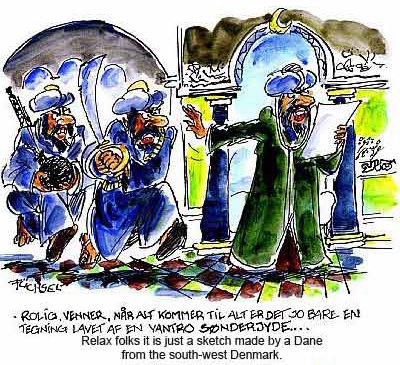The Jyllands-Posten Cartoons.

The twelve cartoons. This blog is maintained by someone with very simpleminded views. His comments on the cartoons are naive and clouded by emotion at best. I am not judging whether his support for publication is right or wrong (that is the matter of argument, after all) but I do judge the quality of his arguments. But he is accorded the right to freedom of expression; I must allow you freedom of judgement.
You will find, in the following articles, more sophisticated discussion of whether the cartoons should have been published in the first place, and of the events subsequent (or consequent) to the publication. Often, you will find balanced views; there is no argument for either stance that is without some consideration of opposing perspectives.
(The emphases -- italicizations -- in the quotes are mine.)
1) The Right to Ridicule. "Freedom of speech is not just a special and distinctive emblem of Western culture... Free speech is a condition of legitimate government."
2) The Right to Give Offence. "Give me liberty to know, to utter and to argue freely according to conscience, above all liberties." (A good example of how historical figures are quoted meaningfully and usefully in argumentative writing.)
3)
The right to be downright offensive. "The UN declaration talks about freedom of speech, freedom of conscience, freedom of religion, not our freedom to offend."
4) Defend the right to be offended. "The moment you declare a set of ideas to be immune from criticism, satire, derision, or contempt, freedom of thought becomes impossible."
5) Freedom to offend. "Official censorship and self-censorship are, in the long term, greater evils than the nastiest doodlings. But that doesn't mean I'll be congratulating that Danish rag either... it was a deliberately provocative decision... Pity the moderate Danes, Christian and Muslim."
6) Why Canadian Republication Of Danish Cartoons Is Wrong. "The issue here goes beyond the boundaries of free expression; it is about the power of so-called 'free speech' to dehumanize fellow citizens and depict them as 'not like us.'"
7) Danish Imams Propose to End Cartoon Dispute. "...the intention [of re-publication of the cartoons in Norway] was not to provoke just for the sake of provoking, but rather to confront radical Islam in Norway. Perhaps it is necessary to provoke in order to do that..."
8) Europe's double standards. "An Austrian court has recently sentenced British historian David Irving to three years in prison for denying the Holocaust. The decision proved that there are limits to freedom of expression, and hence showed Europe's double standards when it comes to handling the blasphemous cartoons depicting Prophet Mohammed"
9) The Danish cartoons: no double standards. "There has been a public debate in Europe about whether it was decent to publish the cartoons and if they are blasphemous or not. But Muslim rage did not allow much discussion."
10) Does the right to freedom of speech justify printing the Danish cartoons?
Philip Hensher: Yes: "But along with the sympathy one has to feel for people in that beleaguered situation [of being directly persecuated by the cartoons], the uses that the Danish cartoons have been put to in the Muslim world must be challenged.
Gary Younge: No: "...the right to freedom of speech equates to neither an obligation to offend nor a duty to be insensitive. There is no contradiction between supporting someone's right to do something and condemning them for doing it. If our commitment to free speech is important, our belief in anti-racism should be no less so."
11) Danish cartoons stir controversy. (Good for a brief recap of events.) "Some commentators have remarked that in making the demand for the Danish and Norwegian governments to apologise, the Arab demonstrators displayed their poor grasp of what freedom means. They are projecting onto Europe the widespread view that the media is little more than an arm of government, and that governments are answerable for their media's actions. This may be a fact of life in many Middle Eastern countries."
12) The Cartoon Controversy and the Liberal Press. "Just as Muslim leaders and thinkers today are finding, within Islamic tradition itself, the cultural and theological resources for a tolerant and progressive worldview to challenge extreme and militant thinking, so too it is possible for the liberal West to locate, within its own discourse, the seeds for more sensitive media coverage of the world."
"...a crucial distinction between press freedom as a moral right and press freedom as a legal right. Press freedom is a moral right because a man 'owes it to his conscience and the common good' to express his ideas. Yet, precisely because the right is based on the duty one owes to the common good, the right disappears when the duty is ignored or rejected... 'In the absence of accepted moral duties there are no moral rights.'"
Labels: Globalization, Media, Religion

0 Comments:
Post a Comment
<< Home